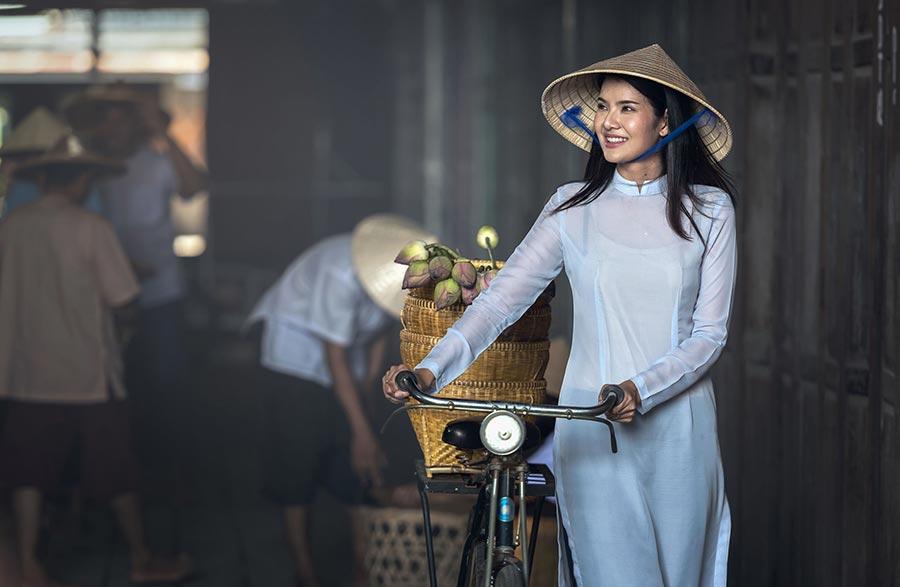The Vietnamese culture – language, customs and etiquette

Friendly, helpful people, imposing temple complexes, great value for the outside – that is the Vietnamese culture in a nutshell. The country and its people are full of secrets and interesting facts. Here you can learn more about the customs and "rules" in the land of smiles. VIETNAM VISA ONLINE has researched for you.
The Vietnamese culture is shaped by the French
The official language in Vietnam is Vietnamese. In addition, some of the population speaks Chinese. And English is also spreading more and more, which can be attributed to the increasing tourism. Particularly interesting about the Vietnamese culture: the country was once a colony of France. For this reason, many Vietnamese speak French.
Helpfulness is very important here
Whether Vietnamese, Chinese, English or French – the locals of Vietnam are extremely solitary and will always do everything to answer the questions of their counterpart. If you have a question during your vacation, do not hesitate to ask a Vietnamese. The good thing is: Compared to many other countries, the helpful people are not pushy towards tourists.
Practical tip: Friendliness is an important part of the Vietnamese culture. If you have a smile on your lips, we will be happy to help you!
Why choose a religion?
Most Vietnamese call their faith Tam giao – a religion that unites Buddhism, Taoism and Confucianism. Meanwhile, pagodas and temples are the places of worship in the country. Some of these impressive buildings are:
- Thien Mu Pagoda, Hue
- Chua Huong, Ha Tay
- Bai Dinh Pagoda, Ninh Binh
- Chua Mot Cot, Hanoi
- Yen–Tu Pagoda, Quang Ninh.
Visit one of these pagodas to get a better understanding of Vietnamese culture.
Hello in Vietnamese
In Vietnam you are greeted with Xin Chao (spoken: "Sin Tschau"). This literally means hello and the expression is accompanied by a friendly nod. In addition, you should enclose the right hand of the person opposite you when greeting. It is a sign of respect.
Important: Older people have a special status in Vietnamese culture. For this reason, older people are greeted first when you meet a group of people.
Dresses play an important role in Vietnamese culture
In Vietnam, great value is placed on a well–groomed appearance. True to the saying clothes make people, it is important to always wear appropriate clothing to express appreciation and respect for those around you. Those who dress poorly or inappropriately are not taken seriously in Vietnamese culture. The most important dress rules are:
- No shoes may be worn in pagodas and temples or in houses
- Bikinis are a no-go for locals
- The same applies to hot pants, mini skirts and low-cut cleavages
- You do not wear swimwear in the restaurant or on the street
- Tops with thin straps and backless dresses should also be avoided.
Note: Even if the dress rules in tourist locations are not so strict, you should pay attention to a "neat appearance" to express appreciation for the country and its people.
Vietnamese culture and celebrations
In Vietnamese culture there are numerous holidays and festivities, most of which have their origins in China. The most important holiday in the country is the Tet festival: the Vietnamese visit their families at the New Year festival to wish them happiness and satisfaction together for the coming year. The festival lasts at least three days and takes place from day one of the first month of the lunar calendar (= around the end of January).
Other important holidays in Vietnamese culture:
- The King Hung Fest March 10th according to the lunar calendar
- National Reunification Day April 30th
- National Day September 2nd
In addition, the International Labor Day on May 1st each year plays an important role in the country. It looks a little different with the birthday. The younger generation celebrates this day, which is due to the external influences on society, but traditionally this day is not very important. In Vietnamese culture it is said, albeit somewhat jokingly, that a person is only important when they are no longer among the living. Accordingly, the whole family gathers to commemorate the deceased's day of death. However, not in mourning, but often in the form of a big festival.
Further tips for your Vietnam vacation
- Never point your finger at other people. This is perceived as extremely rude in Vietnamese culture.
- Never touch a Vietnamese head. This is the noblest part of the body and therefore "untouchable".
- As a couple, you should refrain from kissing in public.
- Before you take pictures of someone, you should ask their permission.
- Avoid (too) deep eye contact during a conversation.
Observe these important basic rules for communicating with Vietnamese so as not to attract negative attention during your vacation!
As you can see, Vietnam offers you a unique adventure. Enjoy togetherness and get to know and love the country. Apply for a Vietnam Visa online now.
Any questions? Please contact us. We're happy to help you.
Created: 2/12/2020 | Modified: 6/20/2023
